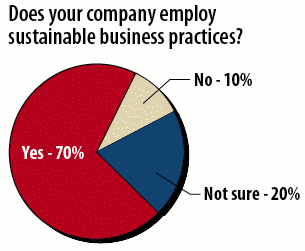 As fuel prices continue to climb, it makes sense that more Oregon businesses are hopping on the sustainability bus. However, there could be some confusion about the finer details.
As fuel prices continue to climb, it makes sense that more Oregon businesses are hopping on the sustainability bus. However, there could be some confusion about the finer details.
As fuel prices continue to climb, it makes sense that more Oregon businesses are hopping on the sustainability bus. However, there could be some confusion about the finer details, as results show in this month’s online survey conducted by Conkling Fiskum & McCormick. Oregonians are no strangers to eco-friendly business practices, the first step toward creating a sustainable business, says author Darcy Hitchcock, who co-wrote The Business Guide to Sustainability . “In many ways, Oregon is farther along [in sustainability] than the rest of the country,” she says. While sustainability can be a source of innovation, Hitchcock explains it’s about more than turning out a few lights . For many businesses, the motivation is personal. It takes time to translate personal ideals into business models, she says, but the results can be cost effective. There is still a gap to bridge on the connection between economic efficiencies and sustainability, which may explain why 59% of the 539 respondents say practicing sustainability does not deliver a competitive advantage. Just as the green building movement slowly progressed, sustainable business practices take time to develop. But, she adds, “they can start anywhere.”
— Colleen Moran

To participate in the Input survey, send an e-mail to [email protected].
Research conducted by Conkling Fiskum & McCormick.


